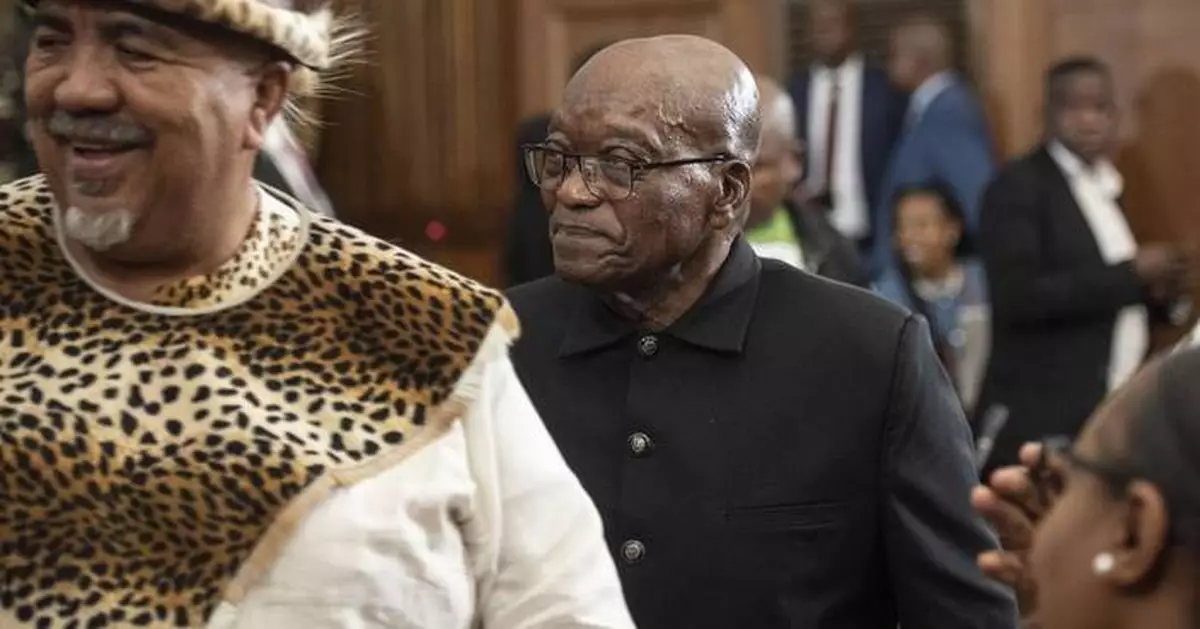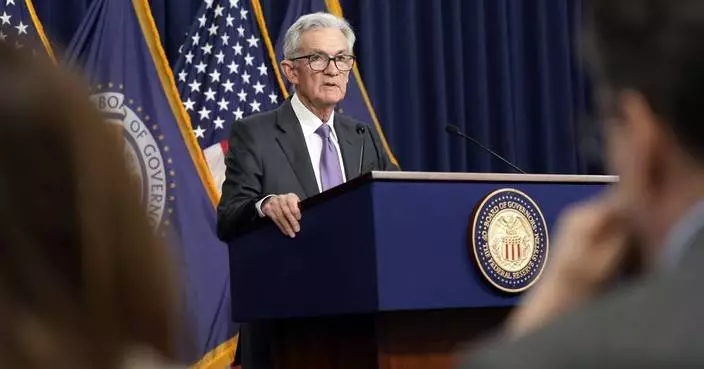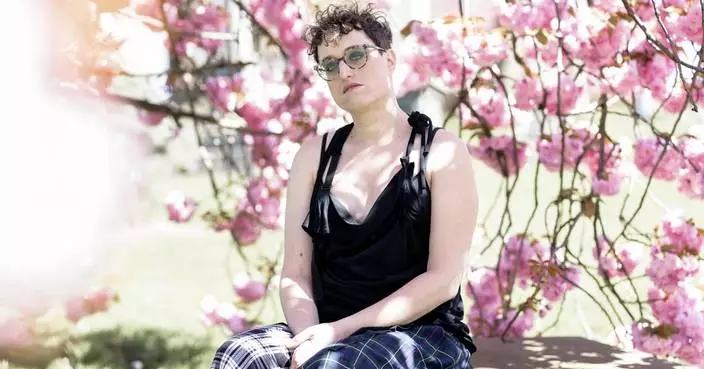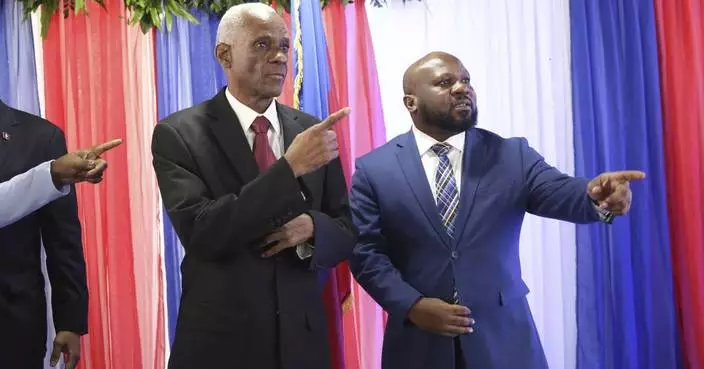JOHANNESBURG (AP) — South Africa’s Electoral Court on Tuesday ruled that former President Jacob Zuma can run for office in the upcoming general election, overturning an earlier decision that had barred him from contesting the polls.
The decision paves the way for Zuma to run for president on behalf of the uMkhonto weSizwe Party, or MK, a new political organization that he joined last year after denouncing the ruling African National Congress party that he once led.
South Africans will elect 400 members of the country's General Assembly on May 29. A month later, the lawmakers in the new parliament will choose the country's president.
The Independent Electoral Commission had earlier ruled that Zuma could not run for office due to his criminal record, after it received an objection against his candidacy.
South Africa’s constitution does not allow people who have been convicted of a crime and sentenced to more than 12 months in prison without the option of a fine to stand for elections as lawmakers.
Zuma was convicted and sentenced to 15 months in prison in 2021 for defying a court order to appear before a judicial commission probing corruption allegations in government and state-owned companies during his presidential term from 2009 to 2018.
However, in a brief court order released on Tuesday, the court announced that an appeal by Zuma and his party was successful and that the objection against his candidacy had been dismissed.
The uMkhonto weSizwe Party welcomed the court decision, saying it had always been its view that the electoral commission's decision to bar Zuma was wrong.
According to its spokesman Nhlamulo Ndhlela, Zuma would appear on the ballot as the party's presidential candidate — meaning that he is likely to be elected as a lawmaker. While the MK may get enough votes for parliament seats, it's not clear if it can win a parliament majority, required for its candidate to be chosen for president.
“We are ecstatic at the court verdict because we have always said that President Zuma and the MK Party's rights have to be upheld,” Ndhlela said. “What this basically means is that he will be our presidential candidate and he will be in Parliament after the elections.”
Political analyst Dirk Kotze, from the University of South Africa, said Zuma was likely to use his court victory to promote his argument that the initial ban on his contesting the election was part of a political campaign against him.
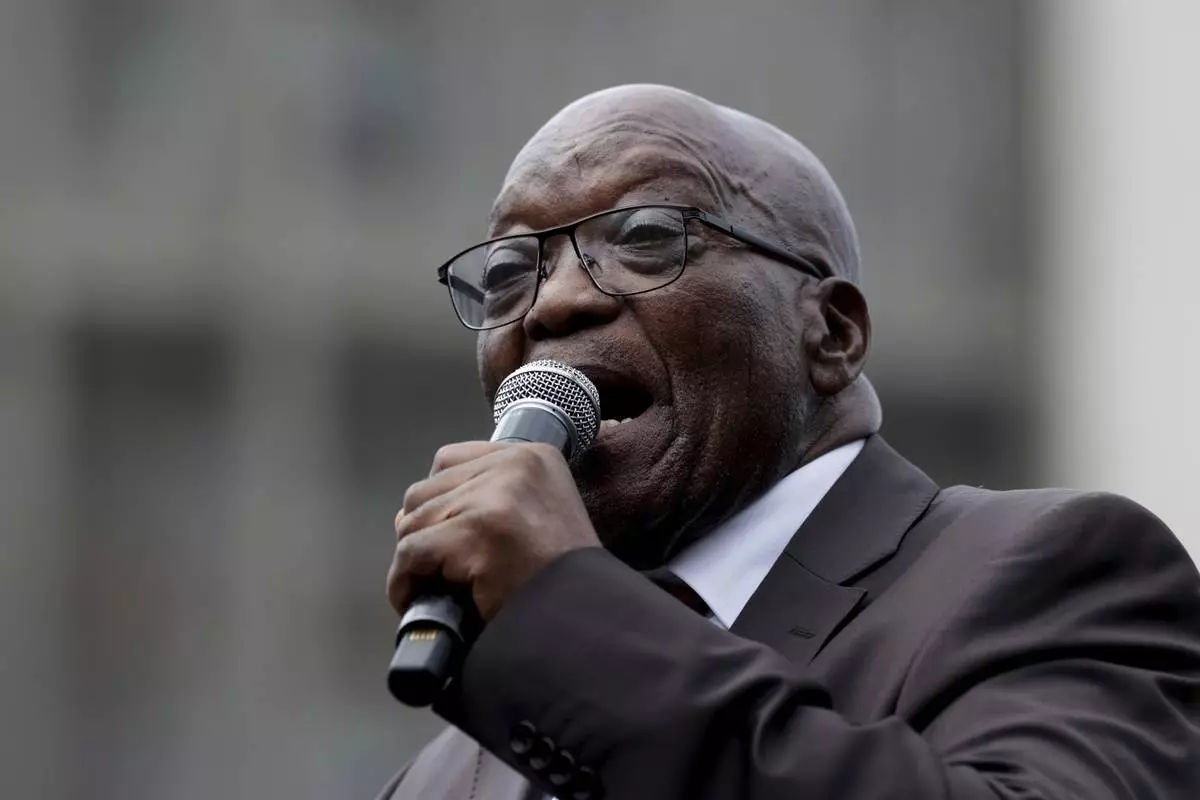
FILE — Former South African President Jacob Zuma addresses supporters of the newly formed uMkhonto weSizwe Party (MK Party) in Durban, South Africa, Wednesday, March 27, 2024. South Africa's election commission has ruled that Zuma is not eligible to run in upcoming elections because of Zuma's criminal record. He was sentenced to 15 months in prison in 2021 for defying a court order to appear before a judicial commission that was investigating corruption allegations during his presidency. (AP Photo, File)

Supporters of former South African President Jacob Zuma stand outside the Electoral High Court in Johannesburg Monday April 8 2024. South Africa's Electoral Court has ruled, Tuesday, April 9, 2024 that Zuma can stand for office as a lawmaker in the country's upcoming elections. (AP Photo)

Former South African President Jacob Zuma in the Electoral High Court in Johannesburg Monday April 8 2024. South Africa's Electoral Court has ruled, Tuesday, April 9, 2024 that Zuma can stand for office as a lawmaker in the country's upcoming elections, (AP Photo)
TBILISI, Georgia (AP) — Georgia’s Parliament moved a step closer Wednesday to passing a law that critics fear will stifle media freedom and endanger the country’s European Union membership bid, as police used water cannons, tear gas and pepper spray against the tens of thousands of protesters who thronged surrounding streets.
Dozens of people were arrested the night before, and mass rallies have continued daily in the capital, Tbilisi. Protesters denounce the bill as “the Russian law” because neighboring Russia uses similar legislation to stigmatize independent news media and organizations critical of the Kremlin.
The law would require media and noncommercial organizations to register as “pursuing the interests of a foreign power,” if they receive more than 20% of funding from abroad. The ruling Georgian Dream party withdrew a similar proposal last year after large crowds protested.
Eighty-three of Georgia’s 150 lawmakers approved the bill in its second reading, while 23 voted against it. A third and final vote in Parliament is needed before it can be signed into law. Georgian lawmaker Irakli Kobakhidze told reporters on Wednesday that he expected that final vote to happen in mid-May.
Russia-Georgia relations have been complicated and turbulent since the Soviet Union’s collapse in the early 1990s. The two countries fought a short war in 2008 that ended with Georgia losing control of two Russia-friendly separatist regions.
In the aftermath, Tbilisi severed diplomatic ties with Moscow, and the issue of the regions’ status remains a key irritant, even as relations have somewhat improved.
Georgia joined international resolutions condemning Russia's full-scale invasion of Ukraine, but it also became a main destination for Russians fleeing military mobilization and political crackdowns. Even Georgia's ruling party has seen internal tensions over its neighbor.
The Interior Ministry said that 63 people were detained following Tuesday's protest.
Georgian television showed Levan Khabeishvili, chairman of the pro-West United National Movement party, arriving in Parliament on Wednesday morning with bandages on his nose and forehead. Members of Khabeishvili's party said that he had been assaulted by police during the protests.
Purple bruising and cuts were visible around Khabeishvili's left eye as he urged fellow lawmakers to scrap the bill.
“If you are not interested in how the leader of the main opposition party has been beaten up, then — for the sake of those young people who were injured, who were hit on the heads and bruised — I want to ask you once more, even though I do not have any hope, withdraw this law,” he said.
Deputy Interior Minister Aleksandre Darakhvelidze alleged at a briefing Wednesday that Khabeishvili broke through a police cordon the night before and was injured while he “resisted.” Darakhvelidze alleged that protesters and opposition leaders were “constantly committing violence.” Police broke up the protest after demonstrators tried to block entrances to Parliament.
As protesters gathered once more Wednesday, opposition lawmaker Beqa Liluashvili published a live video from the Parliament chamber showing lawmakers shouting and physically confronting each other. One threw a stack of papers at opponents. Others restrained colleagues.
Opposition lawmaker Helene Khoshtaria accused the ruling party of trying to “drag Georgia into Russian influence” and “close off its European future.”
Speaking to The Associated Press outside Parliament, she described authorities’ response to the rallies as “extremely authoritarian" but said it would not dissuade the protesters.
“We do not want the Soviet regime that our parents have experienced," one protester, Kato Salukvadze, told the AP late Tuesday. “I think that everyone should be in the streets and say no to the Russian law and yes to Europe."
Georgian President Salome Zourabichvili, increasingly at odds with the governing party, has criticized the bill and vowed to veto it if it is passed by Parliament. But the governing party can overrule the veto and ask the parliamentary speaker to sign the bill into law.
At a media briefing Wednesday, Kobakhidze spoke openly of Georgian Dream's intention to do so, and defended Tbilisi's forceful response to the protests.
“There will be demonstrations today, during the third reading, during the overriding of the veto. (When the law passes), there will be a few days of discomfort. However, in the long term, we will insure the country against polarization and radicalism for years," Kobakhidze told reporters.
EU foreign policy chief Josep Borrell posted on X on Wednesday that Tbilisi's use of force against the demonstrators was “unacceptable.”
“Georgia is an EU candidate country, I call on its authorities to ensure the right to peaceful assembly,” he said.

A demonstrator gestures while arguing with the police during an opposition protest against "the Russian law" near the Parliament building in Tbilisi, Georgia, on Wednesday, May 1, 2024. Protesters denounce the bill as "the Russian law" because Moscow uses similar legislation to stigmatize independent news media and organizations critical of the Kremlin. (AP Photo/Zurab Tsertsvadze)

Demonstrators wave Georgian national flag during an opposition protest against "the Russian law" near the Parliament building in Tbilisi, Georgia, on Wednesday, May 1, 2024. Protesters denounce the bill as "the Russian law" because Moscow uses similar legislation to stigmatize independent news media and organizations critical of the Kremlin. (AP Photo/Zurab Tsertsvadze)

Demonstrators argue with police that blocked them during an opposition protest against "the Russian law" near the Parliament building in Tbilisi, Georgia, on Wednesday, May 1, 2024. Protesters denounce the bill as "the Russian law" because Moscow uses similar legislation to stigmatize independent news media and organizations critical of the Kremlin. (AP Photo/Zurab Tsertsvadze)

Demonstrators blocked by the police wave a EU flag during an opposition protest against "the Russian law" near the Parliament building in Tbilisi, Georgia, on Wednesday, May 1, 2024. Protesters denounce the bill as "the Russian law" because Moscow uses similar legislation to stigmatize independent news media and organizations critical of the Kremlin. (AP Photo/Zurab Tsertsvadze)

Police face demonstrators during an opposition protest against "the Russian law" near the Parliament building in Tbilisi, Georgia, on Wednesday, May 1, 2024. Protesters denounce the bill as "the Russian law" because Moscow uses similar legislation to stigmatize independent news media and organizations critical of the Kremlin. (AP Photo/Zurab Tsertsvadze)

A woman shows a heart standing in front of riot police during an opposition protest against "the Russian law" near the Parliament building in Tbilisi, Georgia, on Wednesday, May 1, 2024. Clashes erupted between police and opposition demonstrators protesting a new bill intended to track foreign influence that the opposition denounced as Russia-inspired. (AP Photo/Zurab Tsertsvadze)
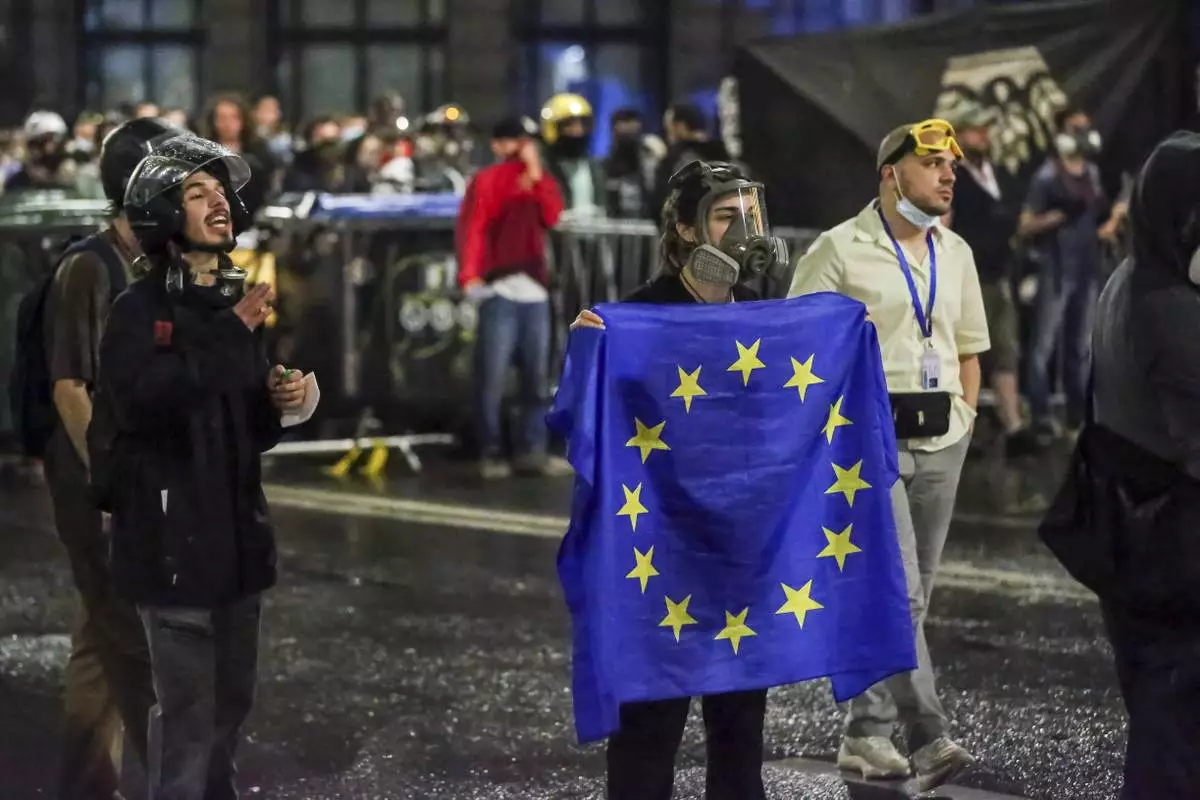
A demonstrator stands with a EU flag in front of police block during an opposition protest against "the Russian law" near the Parliament building in Tbilisi, Georgia, on Wednesday, May 1, 2024. Clashes erupted between police and opposition demonstrators protesting a new bill intended to track foreign influence that the opposition denounced as Russia-inspired. (AP Photo/Zurab Tsertsvadze)
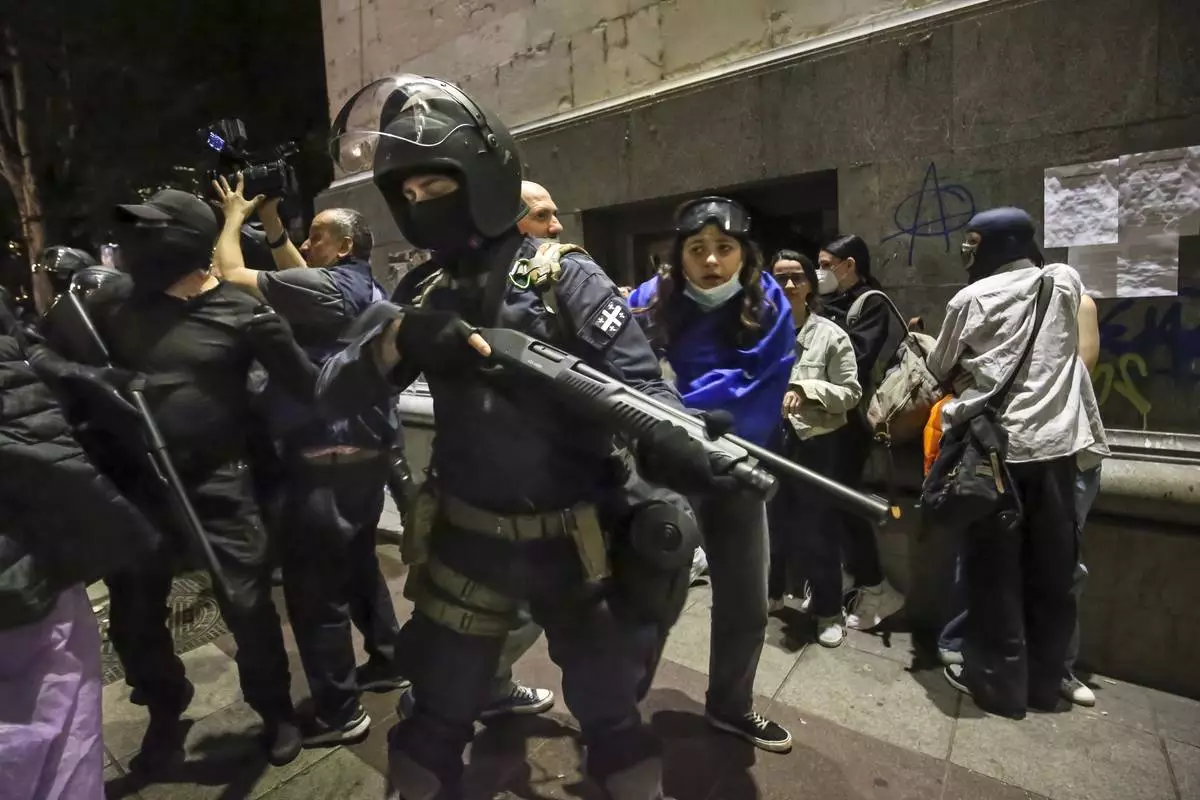
Riot policemen stand ready to fire gas grenade during an opposition protest against "the Russian law" near the Parliament building in Tbilisi, Georgia, on Wednesday, May 1, 2024. Clashes erupted between police and opposition demonstrators protesting a new bill intended to track foreign influence that the opposition denounced as Russia-inspired. (AP Photo/Zurab Tsertsvadze)
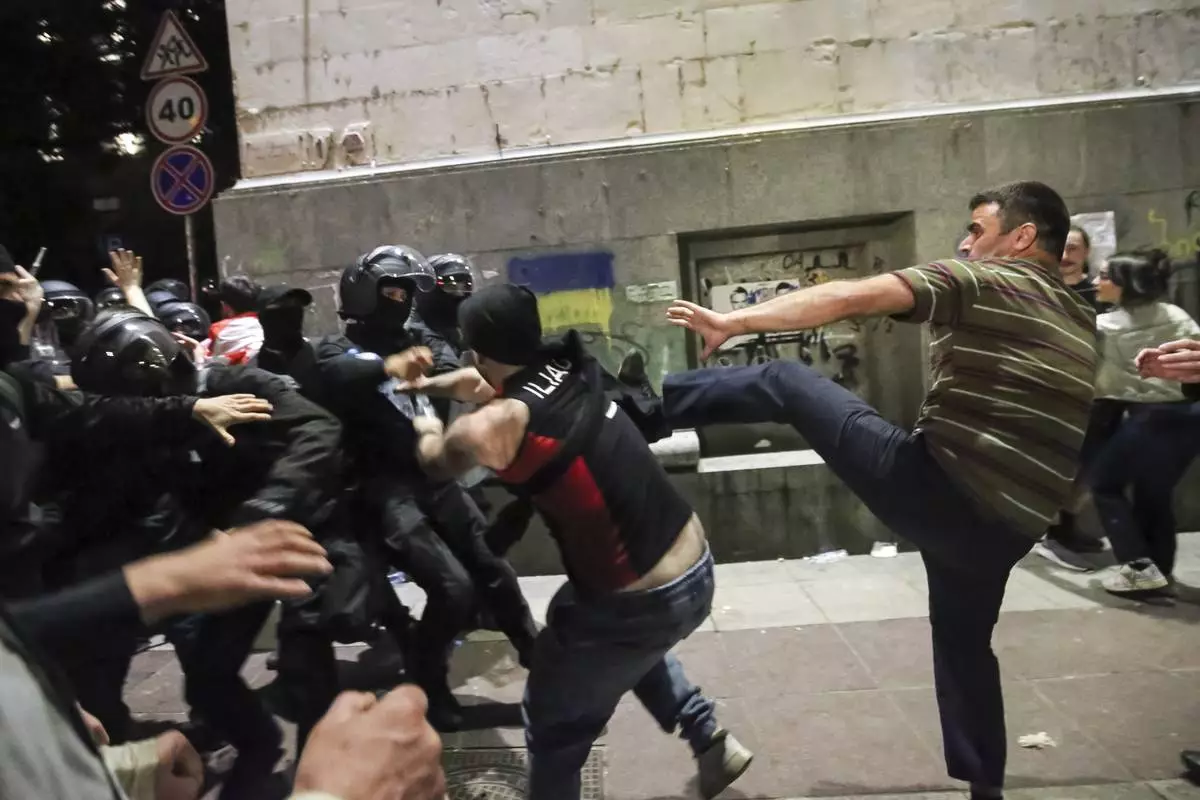
Demonstrators scuffle with riot police during an opposition protest against "the Russian law" near the Parliament building in Tbilisi, Georgia, on Wednesday, May 1, 2024. Clashes erupted between police and opposition demonstrators protesting a new bill intended to track foreign influence that the opposition denounced as Russia-inspired. (AP Photo/Zurab Tsertsvadze)
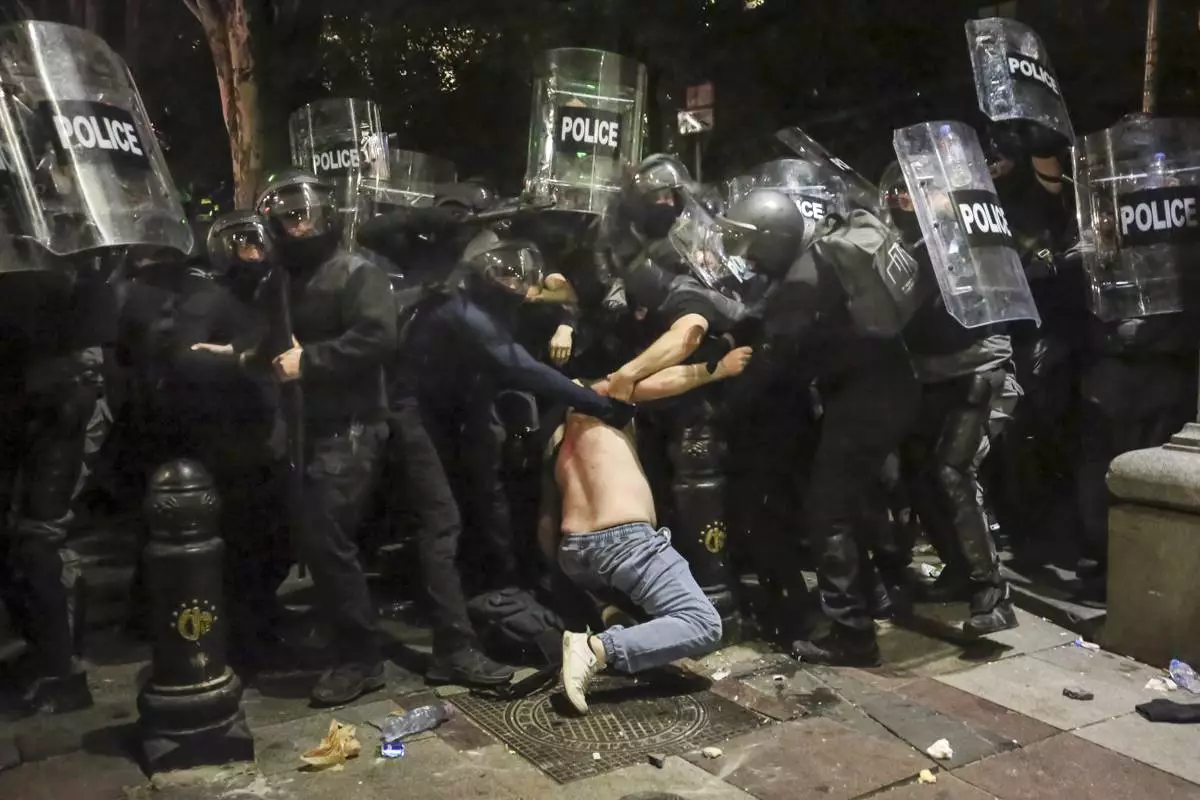
Riot police detain a demonstrator during an opposition protest against "the Russian law" near the Parliament building in Tbilisi, Georgia, on Wednesday, May 1, 2024. Clashes erupted between police and opposition demonstrators protesting a new bill intended to track foreign influence that the opposition denounced as Russia-inspired. (AP Photo/Zurab Tsertsvadze)
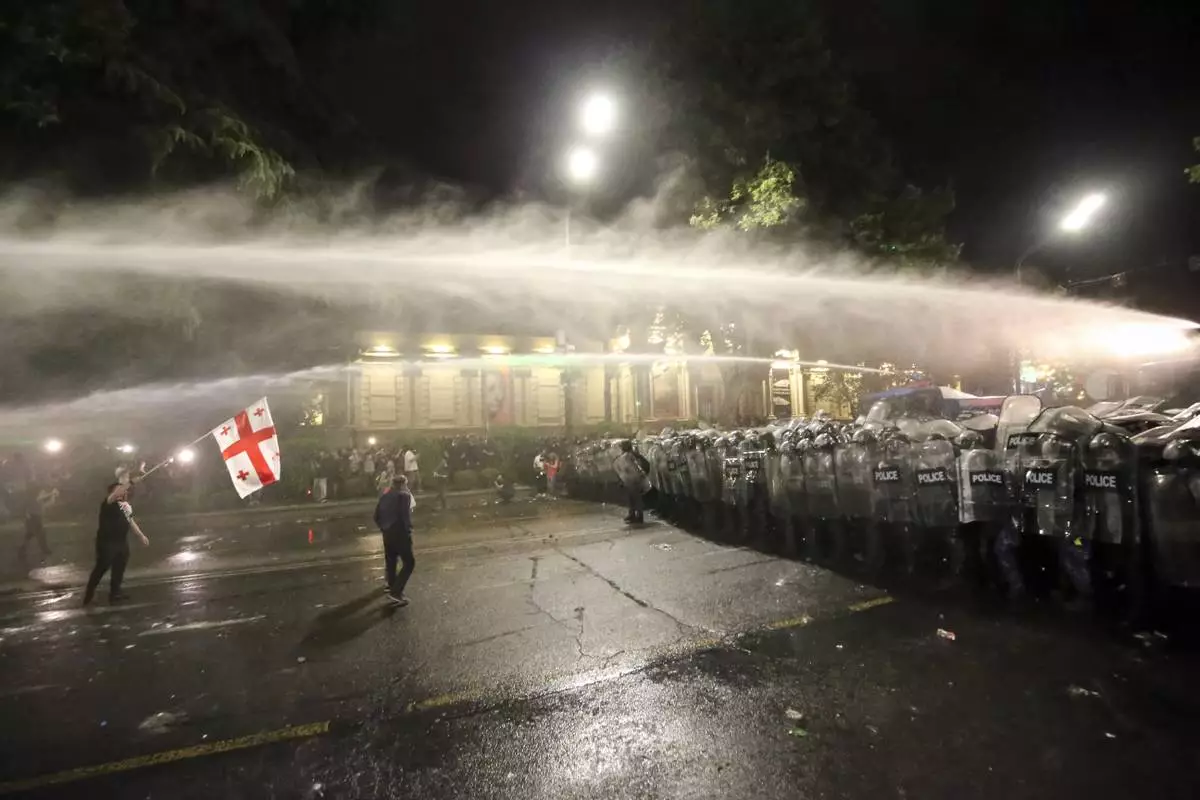
Riot police use a water cannon during an opposition protest against "the Russian law" near the Parliament building in Tbilisi, Georgia, on Wednesday, May 1, 2024. Clashes erupted between police and opposition demonstrators protesting a new bill intended to track foreign influence that the opposition denounced as Russia-inspired. (AP Photo/Zurab Tsertsvadze)
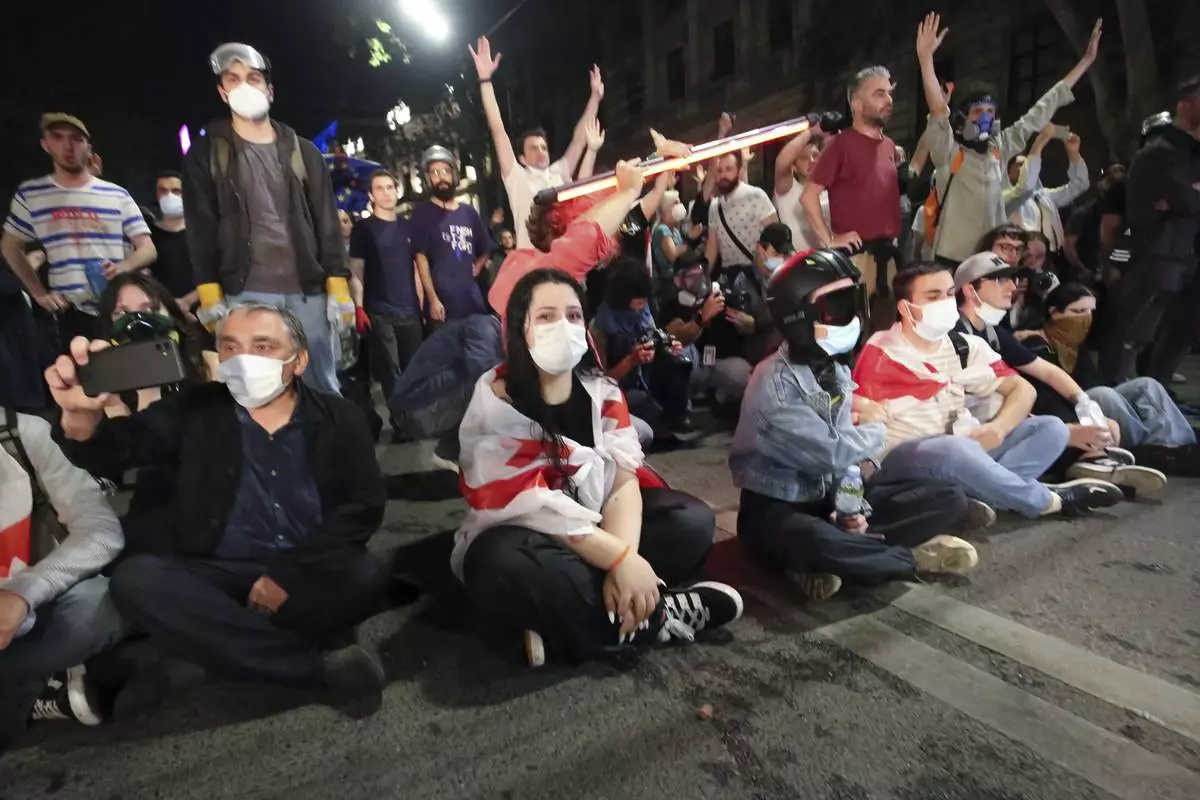
Demonstrators sit in front of police line during an opposition protest against "the Russian law" near the Parliament building in Tbilisi, Georgia, on Tuesday, April 30, 2024. Clashes erupted between police and opposition demonstrators protesting a new bill intended to track foreign influence that the opposition denounced as Russia-inspired. (AP Photo/Zurab Tsertsvadze)





